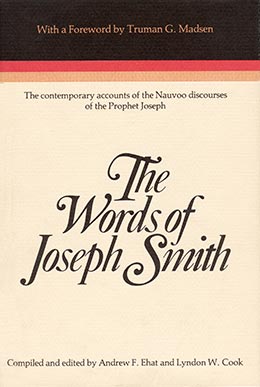7 October 1843 (Saturday Morning)
[1] Saturday, 10 o'clock A. M.
Conference assembled and proceeded to business.
President Joseph Smith was called to the chair, and Gustavus Hills [2] chosen clerk.
Opened with singing by the choir, and prayer by elder Almon Babbitt.
The president stated the items of business to be brought before the Conference, to be.
1st. The case and standing of elder Sidney Rigdon, counsellor to the First Presidency.
2d. The further progress of the Temple; after which, any miscellaneous business.
Elder Sidney Rigdon addressed the conference on the subject of his situation and circumstances among the saints.
President Joseph Smith addressed the conference, inviting an expression of any charges or complaints which the Conference had to make. He stated his dissatisfaction with elder Sidney Rigdon as a counsellor, not having received any material benefit from his labors or counsels since their escape from Missouri. Several complaints were then brought forward in reference to his management in the Post Office; a supposed correspondence and connection with John C. Bennett, with Ex-Governor Carlin, and with the Missourians, of a treacherous character: also his leaguing with dishonest persons in endeavoring to defraud the innocent.
President Joseph Smith related to the Conference the detention of documents from J. Butterfield, Esq., which were designed for the benefit of himself, (President Smith,) but was not handed over for some three or four weeks, greatly to his disadvantage. Also, an indirect testimony from Missouri, through the mother of Orin P. Rockwell, [3] that said Rigdon and others had given information, by letter, of President Smiths' visit to Dixon, advising them to proceed to that place and arrest him there. He stated that in consequence of those, and other circumstances, and his unprofitableness to him as a counsellor, he did not wish to retain him in that station, unless those difficulties could be removed; but desired his salvation, and expressed his willingness that he should retain a place among the saints.
Elder Almon Babbitt suggested the propriety of limiting the complaints and proofs to circumstances that had transpired since the last Conference.
President Joseph Smith replied, and showed the legality and propriety of a thorough investigation, without such limitation.
Elder Sidney Rigdon plead, concerning the documents from J. Butterfield, Esq., that he received it in answer to some inquiries which he had transmitted to him—that he received it at a time when he was sick, and unable to examine it—did not know that it was designed for the perusal and benefit of President Joseph Smith—that he had, consequently, ordered it to be laid aside, where it remained until inquired for by Joseph Smith. He had never written to Missouri concerning the visit of Joseph Smith to Dixon, and knew of no other person having done so. That, concerning certain rumors of belligerent operations under Governor Carlin's administration, he had related them, not to alarm or disturb any one, but that he had the rumors from good authorities, and supposed them well founded. That he had never received but one communication from John C. Bennett, and that of a business character, except one addressed to him conjointly with Elder Orson Pratt, which he handed over to President Smith [4]—that he had never written any letters to John C. Bennett.
The weather becoming inclement, Conference adjourned until Sunday 10 o'clock A. M.
—7 October 1843
Notes
[1] See History of the Church, 6:47-48. Not in Teachings. The original source for the entry in History of the Church is Times and Seasons (15 September 1843). The following remarks by the Prophet were made at the October 1843 General Conference of the Church.
[2] Gustavus Hills, born 29 January 1804, was a native of Chatham, Middlesex Count, Connecticut. A watchmaker by trade, Hills was an associate justice of the municipal court of Nauvoo.
[3] Orrin Porter Rockwell (1813-78). A colorful personality baptized in 1830, Rockwell was charged by Missourians with assault with intent to kill ex-Governor Lilburn W. Boggs. He remained a close friend of the Prophet.
[4] The letter referred to is published in History of the Church, 5:250-51.
